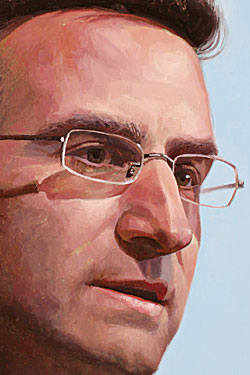 |
Painting by Alex Roulette
(Photo: Ramin Talaie/Corbis News) |
When Peter Orszag left his post as White House budget director last summer, it made perfect sense, on several levels, that he ended up in an office next to Bob Rubin. Rubin, the Clinton-era Treasury secretary, had the year before resigned his position as senior counselor to Citigroup, a job for which he was paid $115 million, plus options, over nine years. Rubin’s tenure ended shortly after the bank’s near implosion and subsequent $45 billion government bailout. Rubin was temporarily bivouacked at the Council on Foreign Relations on the Upper East Side, which is something like a gentlemen’s club for the Davos crowd, one of the places, much like the West Wing of the White House, where finance and civic engagement meet and mix. Orszag was in preliminary talks with NYU about joining the faculty, but Rubin talked with Orszag about joining the Council on Foreign Relations instead. It was an influential perch from which the 42-year-old economist could write op-eds, give speeches, and travel the conference circuit. But the Council, for someone like Peter Orszag, was not a place to linger. It was a place to pass through on his way to somewhere else—and that somewhere else was Wall Street. For one of the most talented economists of his generation, the revolving door was about to spin.
Shortly after leaving the White House, Orszag talked to Rubin’s close friend Roger Altman, the former deputy Treasury secretary who founded the boutique investment bank Evercore Partners, about joining his firm. But then Orszag met another one of Rubin’s friends, Lew Kaden, a top Citigroup executive, at a private dinner at the Council. Kaden, a former lawyer for Davis Polk and aide to Bobby Kennedy, had himself been brought to Citi by Rubin, even though Kaden had had no banking experience.
Orszag was already deep in talks with Altman, but Kaden kept pressing, which is how Orszag found himself one morning a few weeks later in the Park Avenue office of Citigroup CEO Vikram Pandit. Pandit had a problem—one that a man with a pedigree like Orszag’s was tailor-made to solve, even if he never made the firm a dollar. Citigroup was the most high-profile of Wall Street’s basket cases, the definitionally too-big-to-fail institution. With massive exposure to the housing crash and abysmal risk management, the firm cratered, surviving as a virtual ward of the state after the government injected billions and took a 36 percent ownership position. Along with AIG and Fannie and Freddie, Citi came to be seen as a pariah institution, felled by management dysfunction and heedless greed in pursuit of profits. Complicating matters for Citi, the wounded bank found itself tangled in the populist vortex that swirled in the crash’s wake. On the left, there were calls that Citi should be outright nationalized, stripped down, and sold off for parts. Pandit was called before irate congressional-committee members to answer for Citi’s sins, an ignominious inquisition captured on live television. In January 2009, under pressure, Citi canceled an order for a new $50 million corporate jet.
There was plenty of blame to go around at Citi. Chuck Prince, a lawyer by training who succeeded Citi’s outsize former CEO Sandy Weill, had little grasp of the complex mortgage securities Citi’s traders were gambling on. As late as the summer of 2007, when the housing market was in free fall, Prince infamously told the Financial Times that “as long as the music is playing, you’ve got to get up and dance.”
Bob Rubin himself pushed the bank to take on more risk in order to increase its profitability, a move that Citi’s dismal risk management was ill-equipped to handle. Pandit, whom Rubin had helped to recruit in 2007 just as the economy began to unravel, was tasked with cleaning up the mess when he became CEO in December of that year, and his early tenure had a deer-in-headlights character. Eventually, he realized that the asset class Citi lacked most was human capital, of the blue-chip variety. Orszag’s gilded résumé—Princeton, London School of Economics, Brookings Institution, Clinton White House under Nobel laureate Joseph Stiglitz, head of the Congressional Budget Office, White House budget director—would be a valuable investment in this effort. For Citi, hiring a man like Orszag, like Rubin before him, signaled that Citi would be invested in the intellectual marketplace, no mere profiteering bank but a significant American institution. Orszag’s wisdom about markets is certainly valuable; but even more valuable is his role as an impeccable ambassador for the bank, a kind of rainmaker, but at the stratospheric level. Just about anyone will take the call of a former White House budget director. “He’s a guy who can be effective in a lot of rooms,” one Democratic financier who knows Orszag told me.

